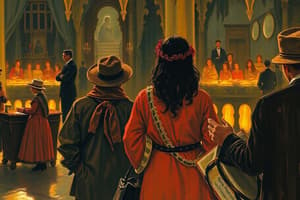Podcast
Questions and Answers
What are consumers considered in market economies?
What are consumers considered in market economies?
the cornerstone of market economies
Which of the following are social factors that influence consumer behavior? (Select all that apply)
Which of the following are social factors that influence consumer behavior? (Select all that apply)
- Subculture
- Social Roles and Status (correct)
- Reference Groups (correct)
- Family (correct)
What does personal factor include in consumer behavior?
What does personal factor include in consumer behavior?
age, life-cycle stage, occupation, economic situation, lifestyle, and personality
Cultural attitudes towards ________ can influence preferences for eco-friendly products.
Cultural attitudes towards ________ can influence preferences for eco-friendly products.
Which of the following stages is NOT part of the consumer buying process?
Which of the following stages is NOT part of the consumer buying process?
What triggers problem recognition in the buying process?
What triggers problem recognition in the buying process?
Flashcards are hidden until you start studying
Study Notes
Consumer Behaviour
- Consumers define market economics and their behavior influences supply and demand through purchases.
- Early humans relied on hunting and gathering for survival, utilizing resources like fruits, nuts, and animal meat.
Social Factors
- Family: Family significantly impacts consumer behavior, shaping values, preferences, and buying habits.
- Reference Groups: Individuals identify with or look up to reference groups like friends, colleagues, or celebrities.
- Social Roles and Status: Consumer behavior is influenced by multiple roles in society (e.g., parent, employee) and status within those roles.
Cultural Factors
- Culture: Culture influences consumer behavior through values, beliefs, and customs.
- Subculture: Subcultures, characterized by distinct values and lifestyles, are smaller groups within a culture. Marketers often tailor products and communications to resonate with these groups.
- Social Class: Social class, a division of society based on socioeconomic status, influences preferences, buying behaviors, and access to resources.
Personal Factors
- Age and Life-Cycle Stage: Consumer needs and preferences change throughout life.
- Occupation: Purchasing decisions depend on occupation.
- Economic Situation: A consumer's economic status impacts their spending patterns.
- Lifestyle: Lifestyle reflects one's pattern of living, influencing how consumers spend their time and money.
- Personality and Self-Concept: These factors influence buying behavior, shaping individual preferences.
Consumer Buying Process
- This process is a critical framework for understanding how consumers make purchase decisions.
- Businesses can develop effective marketing strategies by understanding each stage of the process.
Consumer Buying Process: Different Stages
- Problem Recognition: The buying process begins when the consumer identifies a need or problem.
- Information Search: Consumers actively seek information on the problem, seeking solutions and comparing alternatives.
- Evaluation of Alternatives: Consumers evaluate potential solutions, considering factors like price, features, and brand reputation.
- Purchase Decision: Consumers make a decision on the purchase, potentially influenced by factors like availability and price.
- Post-Purchase Behavior: After purchase, consumers experience feelings of satisfaction or dissatisfaction.
Problem Recognition
- Internal stimuli (e.g., hunger, thirst) and external stimuli (e.g., advertising, social influence) can trigger problem recognition.
Studying That Suits You
Use AI to generate personalized quizzes and flashcards to suit your learning preferences.




